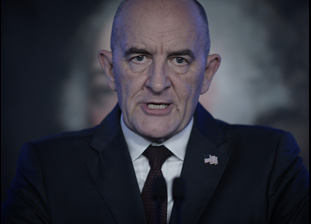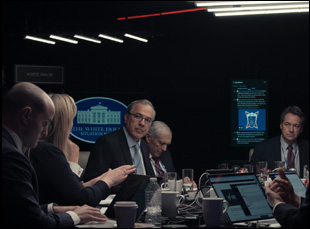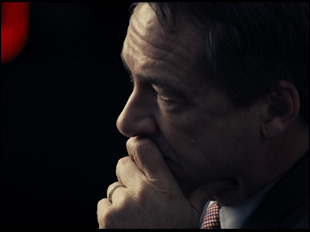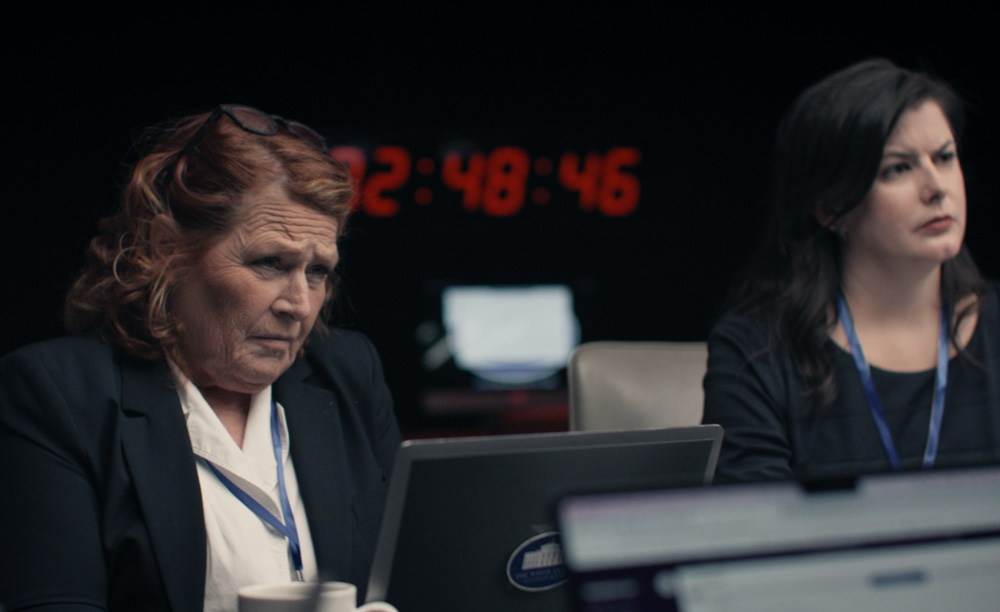The palpable feeling of relief that comes at the end of “War Game” may be short-lived but nonetheless rejuvenating when a hypothetical scenario set up by the nonpartisan political advocacy foundation VetVoice reaches its conclusion, partially when its premise of what the real-time reaction would be if the chain of command broke down in deeper ways than it did on January 6, 2021 as the U.S. Capitol was being breached and armed forces that were in charge of protecting those inside actually joined with the insurrectionists remains something that can only be imagined. However, what may keep hearts racing even after co-directors Jesse Moss and Tony Gerber take down the temperature of witnessing the likes of former Montana Governor Steve Bullock take on the role of fictional President Hotham at the helm of a command center that includes former Georgia Senator Doug Jones and South Dakota Senator Heidi Heitkamp as advisors putting together a plan of action is witnessing the shared desire to see the republic saved, a goal that no longer seems as unifying as it once was.
Gerber and Moss had known that a simulation could open a window onto a modern-day reality that was closed otherwise when they first collaborated on the 2008 feature “Full Battle Rattle,” finding a unique perspective on the mindset of American solders by heading to California where those about to deploy trained in virtual reality for their tour of duty in Iraq, observing the exercises they were put through but just as crucially the attitudes that were shaped by the practice. “War Game” offers similar revelations when general audiences may end up learning quite a bit about the insurrection act — the presidential power to deploy federal troops to states, should their governments demand it — as President Hotham tries to tamp down a coup breaking out when military officials declare his orders illegitimate when his opponent contests an election. However, equally illuminating are the participants’ reasons for engaging with the VetVoice event and their own reactions to find out themselves how such a crisis could play out when there are areas of consensus where decisions can be made.
As disinformation flooding into social media makes a mess of the imaginary situation, the sight of direct interaction between former government officials and military personnel comes across as especially refreshing and as Moss and Gerber take time out of the simulation to get to know its primary organizer Janessa Goldbeck and Kris Goldsmith, who fills the role of a militia leader, a little better among others, the large and seemingly unstoppable machinery of a political system that seems outside anyone’s control suddenly seems more within reach as “War Game” shows the human elements at play not only in the choices about preventing violence with force but with rhetoric. When conversations prove to be such a crucial component to reach peace in the exercise, Gerber and Moss have made them a major component of “War Game”’s rollout, including many of the participants in Q & As following its premiere at Sundance and taking these talks on the road along with the film.
With the film starting its proper theatrical run beginning in New York at Film Forum and headed west later this week en route to theaters throughout the U.S., the filmmakers spoke about their reunion after finding great success on their own as filmmakers — Moss would make “The Overnighters” and “Girls State” (with Amanda McBaine) and Gerber, in addition to an illustrious career as a producer, directed “The Notorious Mr. Bout — and how you go about catching every detail in real-time of an event like the VetVoice simulation.

Tony Gerber: I think it was destiny, right? “War Game” shares DNA with “Full Battle Rattle.” It’s playful in form, it’s politically urgent and it felt like a huge risk, something that we needed to partner on.
Jesse Moss: I think we’ve talked for 15 years about working together on a movie and shared work and still remain close, but there was no question that Tony and I should do this together.
Tony Gerber: When Jesse first told me about what was going on, my heart started to beat. This is exactly the sort of access and subject matter that offers up the opportunity to create something complex in form and I think catches the audience unaware. It’s wonderful when an audience is engaged, but they have no idea where you’re going, and this film does something unusual in terms of how it impacts audience. We first premiered at Sundance last January and we’ve probably had public screenings at least twice a month since then. The world has changed so much that when you see this movie now with an audience, it feels like a different film, but not a frame of it has changed. I find that extraordinary. You create something and it’s fixed and it exists in the world — it’s immutable — but I don’t think that’s true. Works of art change even after they’re completed.
But it really was the formal elements of this as a potential film that got me really excited. The theatrical element of non-actors playing parts without a script, but these parts they know so well and then being able to move backstage, being able to go outside of the proscenium arch. Thematically to me, the film is about reality because it’s reality that’s being contested right now. “The election was stolen”/“No, it wasn’t.” “They’re patriots”/“No, they’re insurrectionists.” And in a lot of ways, this film is about that battle of perception. And in the course of that battle, are there things that we can define as dear? That we can circle the wagons and say, “No, we’re not going allow this to be destroyed,” things like the peaceful transfer of power. It was a beautiful meal that could be cooked out of all of these elements that we had access to.

Jesse Moss: You draw on every film you’ve made in your experience to do something like this. There’s certainly a skillset from “Boys State” and “Girl State” in terms of a very limited period of time to capture the action and a much bigger crew than normally one would work with on a documentary. [There’s] that intersection of narrative and nonfiction and a desire to kind of elevate the language of storytelling in the film. But this was just exponentially more challenging in that the timeframe was so narrow — six hours — and the crew was so big, and [there was] the lack of control over casting, which I had never dealt with, because that is really the prerogative of the documentary filmmaker. You choose who you point the camera at. VetVoice had the power to cast, as they should, who were the role players in this exercise. There are people they drew from their network who have that requisite experience, so we just simply did not know if they were compelling screen characters.
Until the starting gun fired, we didn’t know if we’d have an interesting film. But that was exciting too. The film came together very quickly. Money had to be raised and Tony and I, as two directors, had to find a common shared vision that we wanted to execute. There was an opportunity to do that in designing the set environment of the film, which is rare for nonfiction. We built a team with cinematographers who we have both worked with and respect, who have an ability to sort of capture nonfiction, but with extraordinary artistry. So there was a lot of fear and risk in this project, but it felt necessary and urgent to take those risks and it felt like a really exciting way to tell a really important story and to break new ground for me and for us, I think, as filmmakers.
Even though you couldn’t control casting, you do recognize that why everybody is there participating is as interesting as the outcome of what they’re doing there. Did that come to the fore pretty quickly?
Tony Gerber: Yeah, we didn’t know for example that Ben Radd, the designer of the war game, had this backstory as an Iranian refugee, that as a child, he escaped the fall of the Ayatollah and he saw Iran in civil war and this was a formative experience for him. So when he says in our film, there’s a false sense of security and it can happen here, you really take him at his word. That was a surprise for us. We didn’t know that going in. But [it was about] finding ways to both keep the plot propelling forward and as the movie progresses to deepen the audience’s relationship to characters.
Janessa [Goldbeck] is a very good example of that. When she tells the story of being queer and being in the Marines, and then of her father going down the QAnon rabbit hole, it’s just extraordinary and vulnerable. And she told us recently that she finally sat down and shared the film with her father — which is something we’d been asking her, “When are you going to show your father? — when finally she found a moment to share the film with him, he dug it. He found it well-reasoned. He thought that Steve Bullock as President Hotham was a great leader. And that’s not what we expected. So that says that as filmmakers, we carry assumptions about how prospective audiences might engage, but you really don’t know and the important thing is to listen and remain open to the conversation and to not go in with judgment.

Jesse Moss: It’s felt empowering and every conversation is different. Leaving room for audience engagement is so important and I feel like we’re just getting started. We’re just opening theatrically this Friday and we’ll hopefully platform out across the country and be in the conversation for the next few months, but it’s helped me feel optimistic too. I have loved being on tour with these role players — Heidi Heitkamp, Steve Bullock, Linda Singh, Janessa. They are inspiring people. I really like being with them and getting to know them too because we shot [this] one day and then we went into the edit room for a year, so I didn’t really get to know them. It wasn’t like the kids in “Boys State” where I had deeper relationships with during production, so I think we’re all just finding how the political moment is shaping response and anticipation for what is to come.
That’s not fixed as we know. Even the last three weeks have brought such extraordinary change in our politics, but I feel like the film is no less relevant than it was the day we shot it, the day we conceived it. And I wish in a way I wish for irrelevance, maybe for the sake of our country, but I don’t think that’s realistic. Tony and I have plans to share it in some swing states and purple states, and I don’t expect we’re going to convert the true believers of the MAGA movement. That’s fine. I’ll leave them to their views. But I do think there are people in this country who are searching for ways to process what happened on January 6th, 2021, and how stable or unstable our democracy really is, so hopefully they will be excited by the opportunity to step into the White House Situation Room, and I don’t think it ends with this election. There’s a lot of factors that go into where we are right now in this country, and how we got to this place that we’ve never really looked at. Those are questions we haven’t really asked, and I think the film is part of that conversation.
“War Game” opens on August 2nd in New York at Film Forum and August 9th in Los Angeles at the Nuart Theater, the Gene Siskel Film Center in Chicago and the PFS Bourse Theater in Philadelphia. A full list of theaters and dates is here.




